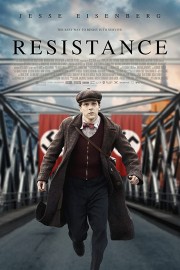Resistance
Once films like “Schindler’s List” and “The Pianist” existed as dramatic narratives about the Holocaust, it became infinitely harder, I think, for stories on the subject to be told. I say that because both of those films set such a high standard for personal, emotional storytelling about Hitler’s “Final Solution,” you have to be able to tell a story capable of just as much passion and feeling as those did to compete, and do it in a way that that comes through. Jonathan Jakubowicz actually has the first part of that equation in the story he has decided to tell in “Resistance”; unfortunately, it does not have a solid execution of that story, and the ideas within it.
The film focuses on Marcel Marceau, the world-famous French mime, and it begins when he is trying out his act in bars prior to the Nazis occupying France in WWII, and his desire to perform is not one that sits well with his butcher father (Karl Markovics). We see him recruited by a scout leader (Edgar Ramírez) friend of his to perform for the orphans they are looking after, and keeping safe as the Nazis begin to move into France. Soon, he is in the thick of the French Resistance, and trying to do what he can to protect the children, many of whom are Jewish, from certain death.
“Resistance” is based on the true story of Marceau’s efforts, which led to him helping saving over a thousand children from the death camps, even when he could not save some of those closest to him. This is a fascinating story, and- in the best possible scenario- could have balanced the light humor in Jesse Eisenberg’s early moments as Marceau with the more pressing moral questions of what he is up against. Eisenberg is actually very good in the role, and I would have liked to see a more natural through line in his arc during the film. Unfortunately, the first half of the film plays a little too close to the tone of “Life is Beautiful,” and the second half- which is, by far, the most compelling half of the film- is more of a straight thriller. There are moments throughout the film’s two hours that stand out for one reason or another, but the consistency in Jakubowicz’s storytelling is not there.
As I mentioned above, the second half of the movie, which deals most directly with Marceau’s efforts in helping to save the children, is the strongest half of the film. It starts with a scene as harrowing as any in the best films about the Holocaust (and I’d even include “Inglourious Basterds” in there, as well), where Emma (Clémence Poésy) and her sister are taken captive by Klaus Barbie (the chilling Matthias Schweighöfer), in hopes of finding out more about the Resistance. Afterwards, there is a scene between Emma and Marcel where they debate the best way to combat the Nazis while staying alive- is it to fight and die, or help others to survive? It’s a compelling dilemma that maybe should have gotten more attention from Jakubowicz in crafting his screenplay; if he had started at this point, and focused on the survival effort, I wonder if the film might have had a stronger impact. Alas, we will never know, and it’s disappointing, because the story is one worth telling.










